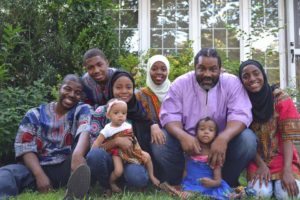“Education among all kinds of men, always had, and always will have, an element of… revolution…” —W.E.B DuBois
“The most revolutionary thing a Black man can do is to build a strong, cohesive family unit.”—Malcolm X
I have 770 children. I fathered six of them, while 764 were birthed to other parents.
As a principal, I view my role and life mission of serving other people’s children in the same way that I want my biological children to be loved: educated, supported, challenged, and held accountable.
There is really no other way to approach this work when you look at fatherhood through an expanded lens; through nation building and honoring the generations to come. Fathers have no choice, they look to their future generations to carry on their work and dreams.
The reason why people describe schools as families is because of the deep relationships that must be present, nurtured and restored, and invested in in order for schools to function at the optimal levels. That is no different than our biological and/or chosen families. As a father or an educator, the required level of commitment means not only thinking about who is in front of you at the moment, but who is yet to come. I fret about my grandchildren and my grand-students, as I expect all to play a role in advancing the cause for our communities. And, my hope wholly lies in the daily investments I put forth in my grands’ future parents.
When faced with the incessantly tough decisions that principals are faced with, I am grateful that my North Star, and that of my leadership team, continues to be, not only what’s best for kids, but what would we want for our own kids.

It is not always easy. But, it is what fathers and father figures are wont to do on behalf of their children. Despite our state’s draconian budget cuts, we determined that we were not narrowing our students’ educational experiences and we maintained art, music, computer science, social-emotional learning (for two grades), internships, and college advising.
When students make poor decisions, we work hard to use restorative practices and learning opportunities for the individuals and the community, much in the same way that, at home, my children’s siblings teach each other and learn from their collective experiences.
And, despite all of this, like any father with a hopeful eye towards the future, we remain committed to the path of continuous improvement. We remain humble about accomplishments, because we see how far we need to go to ensure our children have long-term success. We stress about things like doling out the right amount of guidance and independence.
With individual and communal needs, how do we ensure individual and collective support, growth, and accountability? When are we too invasive, when are we not firm enough? What mistakes should our children learn from? What should be explicitly taught? There is a lot to try to balance.
Ultimately, I find myself repeating some of the same quotes at home and at school: “A smart man learns from his mistakes. A wise man learns from the mistakes of others.” At times, my children are in the same circles as my students and they poke fun at me about my outlook on life and my messages to them:
Work hard. No, harder.
Read. Actually, read some more. You need more books in your life.
What time is it you ask? “It’s nation time! Time for us to unite as a people and stand up as one.”
If you’re not about justice, you’re not about anything.
What do you mean you’re finished your work? I’m almost 50 and I’m not finished. How in the world are you finished?
Lead and serve. And then lead and serve some more.
I love you.
Despite their good natured teasing, I feel good about the consistency. Some of it is just habitual, all of it is deeply rooted in my psyche. After all, I learned them from my community’s fathers.
And, although, as a father, I have sky-high aspirations for those in my charge, I know that ultimately, to myopically prepare our youth for my own vision, will only mute their voices, thwart their aspirations, and hinder their preparedness. Islamic scholar, Ali ibn Abi Talib, once remarked, “Do not raise your children the way [your] parents raised you, they were born for a different time.” However, ensuring that our children and students have the foundational educational experiences that support their intellectual and character development is crucial, and is aligned to what Dr. Martin Luther King called “the goal of a true education.”
The revolution must be cultivated in our homes, in our schools, and, if we are successful, it will be carried on through generations to come. Ensuring our (biological and school-based) offspring’s success is the ultimate duty to our community. It is the enduring test of our fatherhood.
Happy Father’s Day. Happy Father Figures Day as well. To me, they’re one and the same.

